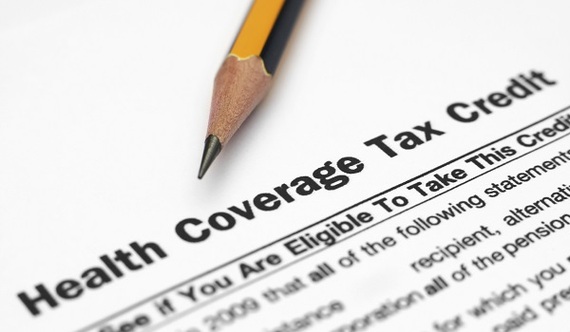The Premium Tax Credit (PTC) may sound like it is a credit only available to top-tier incomes, but it is actually quite the opposite. "Premium" in this case refers to health care premiums, and PTC is a way to help those with relatively low incomes to afford health insurance premiums and avoid the potential penalties (and health hazards) of having no health insurance at all.
Eligibility for the Premium Tax Credit
If you purchased your health insurance through the federal Health Insurance Marketplace or anyone else included on your federal tax return did so, then you may qualify for the PTC. It is the rare tax credit that is both refundable and payable in advance. You may qualify for the credit even if you pay no taxes, and the credit can be supplied in advance to your insurance company to help lower the cost of your monthly premiums.
You must have a sufficiently low income to qualify, generally between 100% and 400% of the federal poverty line for your family size (for 2016, the levels for a family of four are $24,250 to $97,000). You also cannot be claimed as a dependent by another taxpayer, be able to get suitable coverage through an employer plan that meets eligibility requirements, or be eligible for coverage via other government programs such as Medicaid/Medicare. Note that state Medicaid eligibility expansion could reduce your ability to qualify for the PTC.
More: Tax Breaks for the Young
It is also important to file your taxes to receive the credit even though you may not owe any taxes. Failing to file has a double penalty effect -- it not only keeps you from claiming your credit in the filing year, it can disqualify you from receiving advance credits in future years. Filing status can be single or married filing jointly, but not married filing separately (with a few exceptions).
Once you apply for coverage at Healthcare.gov, you will receive an estimate of your PTC based on projections of your income and family parameters for the year. If you choose to take your credit in advance, you will have to make an end-of-year adjustment for tax purposes if your income varies and/or your family size changes during the year. Use IRS Form 8962, "Premium Tax Credit", to determine the difference between the credit you were advanced and the actual credit you received, and file that form along with your tax return.
Note that if the status changes earlier in the year, the difference will be greater. If your income increases significantly, you will need to store away some of that extra cash to cover the difference on the taxes at the end of the year. Minimize the difference by notifying the Marketplace about the change as soon as possible. They will make the necessary adjustments to reduce the effect.
Are you still not sure if you qualify for PTC? You can use the PTC eligibility estimator on the IRS website to double-check your status. A separate IRS page and IRS Publication 974 provide more detailed answers to other PTC questions, such as defining household income and determining if your employer provides an affordable insurance option that excludes you from PTC.
PTC is an important component of making health insurance affordable to all Americans. If you have a low family income but not low enough to qualify for other government programs, PTC is designed for you. Check to see if you qualify. Make sure that your family has the necessary healthcare coverage while saving some bucks at the same time.
This article was provided by our partners at moneytips.com
Photo ©iStock.com/alexskopje
